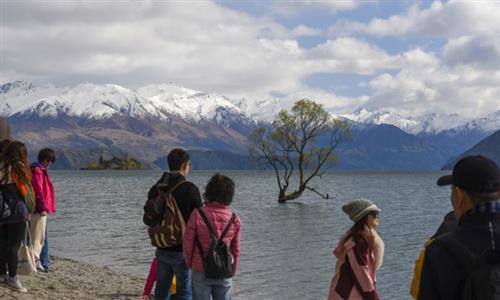
Illustration: Liu Xidan/GT
Six weeks after New Zealand's general election, the new coalition government in Wellington finally took office on Monday after the conclusion of laborious negotiations among the three parties, namely, the National, ACT and New Zealand First. For the first time in New Zealand's political history, a tripartite administration will take governance responsibilities of the country for the three years thereafter.
The new Prime Minister Christopher Luxon has been reiterating his catchphrase, "strength and stability," as the key to the policies and decisions of the future troika administration. It is challenging to maintain unity and consistency in a multi-party structure, "a coalition of many colors," as some media outlets aptly put it. In particular, against the background of today's world fraught with conflicts, tensions and uncertainties, the new government needs to make strenuous endeavors to navigate New Zealand through the labyrinth of difficulties and obstacles, in particular, to expedite the economic recovery, overhaul and revamp the underdeveloped infrastructure, and relieve many people's hardships in their livelihood.
China and New Zealand have enjoyed a comprehensive strategic partnership since 2014. Since December 1972 when the two countries established a diplomatic relationship, proactive and robust bilateral exchanges and cooperation have reaped immense mutual benefits to the economic, social and cultural development of both countries. Bilateral trade at the time of the establishment of the diplomatic relationship was only about $1.7 million, but in 2022 it almost reached $25.2 billion. China has been New Zealand's biggest trade partner, biggest export market and biggest source of import. 30 percent of New Zealand's commodity and service exports are destined for China.
In 2022, a protocol on upgrading the free trade agreement (FTA) between China and New Zealand entered into force. The latest trade policies and business practices have been incorporated to include areas of e-commerce, government procurement, environment and trade, and competition into the FTA framework.
There are roughly 300,000 New Zealanders who are of Chinese ethnicity or ancestry. The Chinese community in New Zealand has been serving as the most important conduit between the two countries since the mid-1850s, contributing to New Zealand's economic, social and cultural prosperity. China is also New Zealand's most important source country of international tourists and students. Over 35 percent of all international students are from China. Such extremely dynamic and fruitful people-to-people connectivity is crucial to the promotion of mutual understanding and trust, which is the cornerstone of the highly productive bilateral relations.
The China-New Zealand relationship has always been in the lead among China's relationships with other Western countries. The bilateral cooperation has created many "firsts," which have been steadily profitable to both countries and peoples.
It is true that the two countries have different systems of governance and cultural traditions, but for over 50 years, such disparities have never hindered the progress of this constructive partnership. Successive governments in Wellington have been working in conjunction with their counterparts in Beijing to seek common grounds on which fruitful collaborations have been flourishing and booming.
As the CEO of Air New Zealand from 2012 to 2019, Luxon achieved enormous success in the development of the Chinese market, boosting travel between the two countries with efficacious pricing tactics and better visa policies, even utilizing the popular Chinese dating TV show, If You Are the One, to promote the airline.
During a press conference prior to the election in October, Luxon indicated unambiguously that under his government, New Zealand's relationship with China would not alter. He has also been clear about his interest in collaboration with China under the Belt and Road Initiative framework.
A three-way coalition would entail negotiations and compromises to accommodate partisan stances and benefits, yet constructivism in handling exchanges and cooperation with New Zealand's biggest trade partner is unquestionably conducive to New Zealand's interests.
We look forward to the new coalition government in Wellington not only steering the Land of the Long White Cloud "back on the track," but also to bringing more impetus and further development to the China-New Zealand partnership.
The author is a professor and director of the New Zealand Studies Centre at East China Normal University. opinion@globaltimes.com.cn


